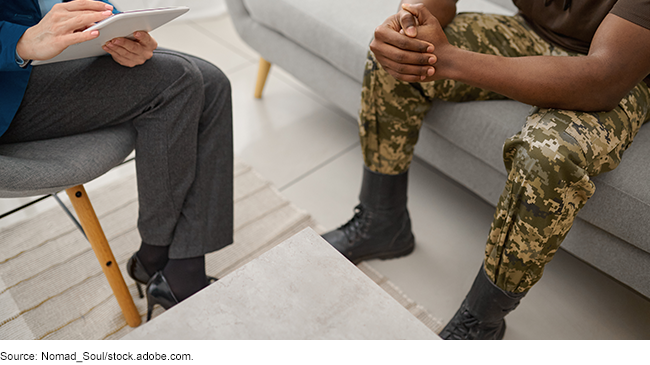What GAO found
The Department of Veterans Affairs (VA) provides medical care to veterans for mental health conditions such as depression and substance use disorders. According to VA data, the percentage of student veterans who received mental health care at a VA facility increased from fiscal year 2017 to fiscal year 2022, and the percentage was higher than the percentage of veterans overall. (See figure.) Veterans data show that student veterans were primarily treated for depression-related disorders, post-traumatic stress disorder, and anxiety-related disorders. VA officials said younger veterans typically seek mental health care more than older veterans, and most student veterans are under 34. Additionally, the COVID-19 pandemic has worsened the mental health status of the general population, including veterans.
Comparison of student veterans and all veterans receiving mental health care in VA facilities from 2017 to 2022.

Note: This percentage is based on student veterans receiving mental health care and all veterans receiving mental health care (i.e., among student veterans receiving mental health care and all veterans receiving mental health care, respectively) , at least one visit for a mental health assessment). In fiscal year 2022, a total of 261,000 student veterans and 5,966,000 veterans received medical care at VA facilities.
VA administers the Integration of Veterans into Academic Leadership program to support the mental health needs of student veterans. Under this voluntary program, VA health systems, including medical centers and other facilities, can partner with local universities to provide campus-based mental health support to student veterans. As of October 2023, 32 of 139 health systems have such programs in place. However, GAO found that VA has not communicated comprehensive information to health systems to help them consider when and how to implement the program, including the staffing requirements. Instead, VA will communicate information about the program upon request. By communicating comprehensive information across the health care system more regularly, including through guidance, VA will ensure that all systems have the information they need to consider participation in the program. I can. This, in turn, will help ensure VA’s ability to support the mental health needs of student veterans.
Why GAO conducted this study
Mental health conditions are a persistent and growing problem for veterans in this country. Research shows that student veterans (students taking educational courses using VA educational assistance benefits) experience more anxiety, stress, depression, and suicidal ideation than non-veteran students. It is suggested that this is likely.
The Supporting Resilience of Our Great Veterans Act of 2022 includes a provision for GAO to study the mental health needs of student veterans. Among other objectives, this report (1) describes what available veteran data indicates about student veteran use of mental health care and (2) advances academic leadership among veterans. examines VA efforts to address the mental health needs of student veterans through integrated programs.
GAO reviewed VA documents and data from fiscal years 2017 to 2022 (the most recent available) on mental health care utilization and diagnoses and conducted a literature review. GAO also interviewed officials from the Department of Veterans Affairs and three non-generalizable veterans service organizations, as well as 12 student veterans identified by one of the veterans service organizations.


